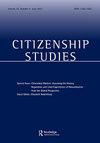国家公民权与后殖民种族主义
IF 1.9
3区 社会学
Q3 POLITICAL SCIENCE
引用次数: 3
摘要
摘要在第二次世界大战后帝国国家向民族国家的决定性转变中,发生了两个相关的过程。为了使种族主义意识形态失去合法性,进行了大规模的努力。与此同时,世界各地的国家主权正在被国有化。民族主义意识形态在政治上不仅合法,而且实际上是强制性的。本次演讲描绘了这段历史,以了解种族主义在后殖民主义时代(即国家主权是霸权国家形式的时代,“民族”和“移民”之间的社会和法律区别被广泛接受的时代)是如何组织、实践和抵制的。我研究了政治的本土化,以及世界各地的民族主义如何越来越多地将“民族”重新配置为本土,即国家“土壤”的“本土”。通过对各种本土运动的讨论,我分析了历史殖民者被重新呈现为“移民”和今天的“移民”被变成“殖民者”的双重迁移。我认为,这样的举动是由后殖民种族主义促成的:“种族”和“国家”概念之间的历史性表述,其中民族土壤的概念被种族化,种族主义的血液概念被领土化。本文章由计算机程序翻译,如有差异,请以英文原文为准。
National citizenship and postcolonial racism
ABSTRACT In the decisive shift from imperial-states to nation-states after World War Two, two related processes took place. There was a wide scale effort to delegitimize racist ideologies. At the same time, state sovereignty across the world was being nationalized. Nationalist ideologies were rendered not only legitimate but practically mandatory in politics. This talk charts this history in order to understand how racism is organized, practiced, and resisted in an era of postcolonialism (i.e. an era when national sovereignty is the hegemonic state form and when the social and juridical distinction between 'national' and 'migrant' are widely accepted). I examine the growing autochthonization of politics and how nationalisms the world over are increasingly reconfiguring the 'national' as an autochthon, i.e. a 'native' of the national 'soil'. Through a discussion of various autochthonous movements I analyze the double move wherein historic colonizers are re-presented as 'migrants’ and today's 'migrants' are made into 'colonizers'. Such a move, I argue, is made possible by postcolonial racisms: the historic articulation between ideas of 'race' and 'nation' wherein ideas of national soil are racialized and racist ideas of blood are territorialized.
求助全文
通过发布文献求助,成功后即可免费获取论文全文。
去求助
来源期刊

Citizenship Studies
POLITICAL SCIENCE-
CiteScore
3.60
自引率
11.10%
发文量
85
期刊介绍:
Citizenship Studies publishes internationally recognised scholarly work on contemporary issues in citizenship, human rights and democratic processes from an interdisciplinary perspective covering the fields of politics, sociology, history and cultural studies. It seeks to lead an international debate on the academic analysis of citizenship, and also aims to cross the division between internal and academic and external public debate. The journal focuses on debates that move beyond conventional notions of citizenship, and treats citizenship as a strategic concept that is central in the analysis of identity, participation, empowerment, human rights and the public interest.
 求助内容:
求助内容: 应助结果提醒方式:
应助结果提醒方式:


